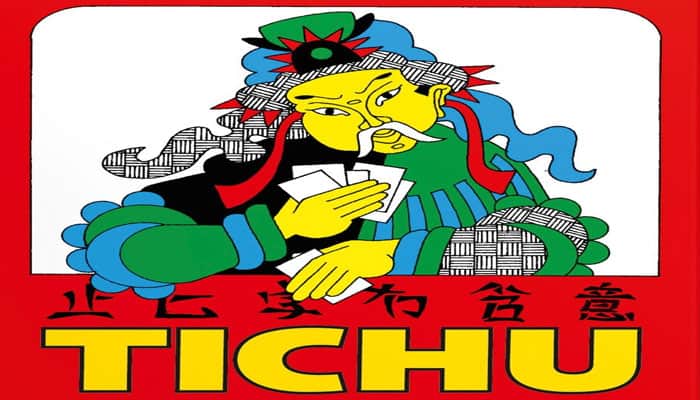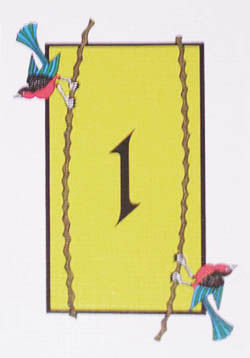

Components
- 112 circus cards: complete 56 card Tichu decks
- rule booklet
The cards, with their four suits:
 Jade
Jade Swords
Swords Pagodas
Pagodas Stars
Stars
Each suit has 13 values, correspond to a "normal" bridge deck. The ace is the highest in each suit and the 2 is the lowest. The 10 ranks between the 9 and the jack, as in most card games.
Four extra cards expand the deck to 56 cards: the Dragon, the Phoenix, the Hound, and the Hemp-Sparrow (or Mah Jong).
Some say tichu cannot be explained but must be experienced. If we believed that, there would be no rules with this game. So, we talked Mr Chuang (the man who taught us the game) into helping us. He drummed up some rules in the backroom of the souvenir shop of the Confucian temple.
At first, he only allowed us to watch. Later, we played and the Chinese experts gave us good advice. We recommend this method of learning most heartily, if you can find a Chinese expert to teach you. Below, you will find rules and other comments for four "Tichu" games, depending on the number you choose to play with.
Object of the Game
The game is played by pairs of two partners with the players of each team sitting opposite one another. During the game, the partners try to help each other score points and gain the lead. The game is played over several hands with the goal to be the first team to score a total of 1000 points.
Setup
Before the game starts, the players choose a starting player who shuffles the cards for the first hand and offers the shuffled deck to the player on his left, who may cut the deck. In subsequent hands, the winner of the previous hand shuffles the deck and offers it to be cut.
The player then places the deck face down in the middle of the table. The Chinese do not deal cards, but rather, they take them. The dealer starts by taking the top-most card. Then, all take turns, in counter-clockwise order, taking one card at a time, until the deck is exhausted and each player holds a fan of 14 cards in his hand.
As in most card games, the players keep their cards secret from each other, including their partners.
Next, the players each push3 cards, 1 to each other player.
They push the cards face down. Once a player has pushed 3 cards, he may pick up the cards pushed to him, adding them to his fanned hand.
Game Play
The player holding the Mah Jong begins by leading (playing face up on the table) any of the following combinations of cards from his hand:
a single card

a pair of cards of equal rank

a sequence of pairs of adjacent value

a trio of cards of equal rank

a full house (trio + pair)

a sequence of length at least 5

The next player (to the right - the Chinese play to the right, like the Swiss and the Hopi) now has the choice of:
- passing or
- playing a similar combination of higher value
A single card can thus only be beaten by a single card of higher value, a sequence of two pairs only by a sequence of two higher pairs, a sequence of eight cards only by a higher sequence of exactly eight cards, a full house only by a higher full house (in full houses the value of the trio is what counts).
Exception: Bombs (see below).
Play continues to the right. As soon as 3 players pass in turn order, the player who played the last (highest) combination gathers in the trick and leads a new combination. If this player has no cards left, he has "gone out" and the right to lead passes to his right-hand neighbor (passing further to the right if the latter has gone out as well).
The Special Cards
Mah Jong

The Mah Jong is an interesting card of mixed reputation, with the following properties:
- its owner starts the hand (but need not lead the Mah Jong).
- the Mah Jong ranks as a 1 and is, therefore, the lowest card in the deck. As a one, it may be included in a suitable sequence (e.g. 1,2,3,4,5).
- when a player plays the Mah Jong, he is allowed to wish for a certain rank (for example an 8 or an Ace, but not a special card). The next player who has a card of the desired rank, and can lawfully play it, must play it (possibly in a bomb! or rarely in a sequence). A player who does not hold or cannot play a card of the desired rank can play any lawfull card or pass.
The wish remains in force until someone fulfils it.
Hound

The faithful Hound has no trick-taking power at all. It can only be played by leading it as a single card and it transfers the right to lead to the player's partner. If the player's partner has already gone out, the lead passes to the partner's right.
Phoenix

The ever-changing Phoenix is the most powerful card in Tichu. However, it counts minus 25 points. It can be played:
as a joker - it can take the place of any normal card in a combination, but may not be used to make a bomb!
as a single card. It's value is half a rank higher than the card it's played after. If an eight is the current highest card played, the Phoenix counts as 8.5, and can be beaten by a nine or higher. The Phoenix can beat an ace, but not the Dragon. If led, the Phoenix counts as 1.5.
Dragon

The Dragon is the highest individual card and is worth 25 points.
When single cards have been played, it is higher, even than an ace or "ace and a half" (the Phoenix over an ace), and can itself only be beaten by a bomb. However: it cannot be part of a sequence.
If the noble Dragon wins a trick, he gives the trick (including its own 25 points) to the opponent of its holder's choice.
Bomb
A Bomb is:
a sequence of at least five consecutive cards in the same suit

or all four cards of the same rank

Bombs can be played at any time, even out of turn, to take a trick. They beat anything, be it a single card or a combination. A higher bomb will beat a lower bomb, so a bomb can be played on a bomb.
The rank of bombs is determined: (1) by the number of cards and (2) by the rank of the cards. A player can even lead a bomb when leading a new trick.
End of a round
The round ends immediately when only one player has cards left in his hand.
Then the tailender (the last player with any cards) hands over the cards remaining in his hand to his opponents and the tricks he won to the winner (the player who has gone out first in the hand). Next, the round is scored.
Scoring a round
Players turn over their tricks and score:
+10 points for each ten

+ 5 points for each five

+ 10 points for each king

+ 25 points for the Dragon

- 25 points for the Phoenix

There are, thus, 100 points for the whole hand, which are divided between the two teams.
If, however, the two players on one team achieve a double victory (being both first and second to run out of cards), the round ends immediately, the counting is skipped, and this team scores 200 points.
The Tichus
A Tichu is a way for players to score even more points, but with a risk.
Small Tichu
Each player may, until he plays his first card in a hand, call "small tichu". If he then wins the round (going out first) his team gets 100 extra points. If he does not go out first in the hand, his team loses 100 points.
Calling tichu is an individual undertaking. The partners cannot discuss it nor arrange it beforehand. Once called, of course, his partner may play to help him during the play of the cards, but they still cannot discuss strategy as they play.
And, the tichant himself must go out first. If his partner goes out first, the team loses the 100 points! Also, the 100 points for tichu are scored independently of, and in addition to, the normal scoring of the hand. Also, a player can call "tichu" long before the player plays his first card. A call before the cards are pushed can be useful as a request for a partner to push over his best card.
Grand Tichu
Of course, where there is a small tichu, there must be a grand tichu, as well. An especially brave or desperate player may, before taking his ninth card from the deck at the beginning of the hand, call "grand tichu". If he then goes out first in the hand, his team scores 200 extra points. If not, his team loses 200 points, as in the rules for his smaller brother.
End of the Game
The team which reaches (or exceeds) a total score of 1000 points at the end of a round wins the game. If both teams are over 1000, the team with the most points wins.
In case of a tie, the game continues until a team has 1000 or more at the end of a round and there is no tie.
Tactical Tips
For hints on tactics, it is best to ask a Chinese bus driver. Since such a person may not be available to all reading these rules, we offer the following from our small experience. Naturally, when placed beside the wisdom of our Chinese tutor these will taste like a dusty dog biscuit beside the highest culinary delights of Nanking.
First, try to get rid of your rotten cards (low singletons and pairs). Also, be sparing with your aces, Dragons, and Bombs early in the hand. A player who has a singleton 4 after a dazzling display of power, was either the victim to an unexpected Bomb or does not understood the game yet.
Keep an eye on the score. If the score is, for example 630:970, a grand tichu is begging to be called.
Unreservedly support your partner's "tichu". When playing the Mah Jong, do not demand a card which might break up your partner's bomb and do not take his trick (this is certainly legal, but it is likely dangerous unless very low ranks are involved)
Try to bring down an opponent's "tichu" when the tichant is the player to his left by making him take his tricks expensively.
Continue Reading

